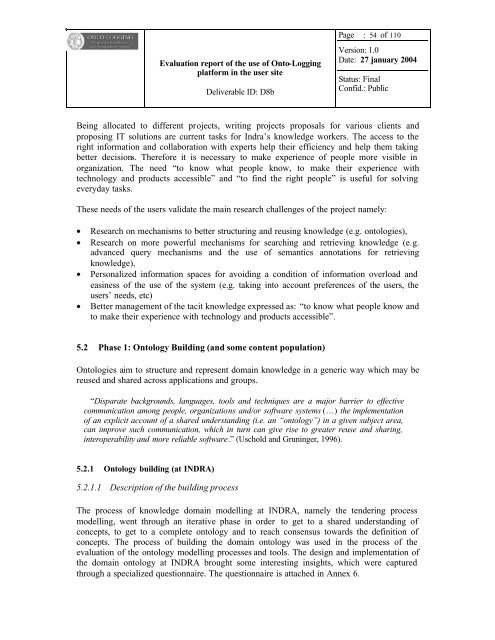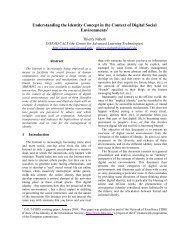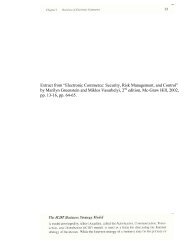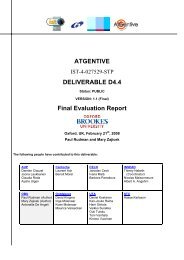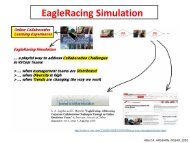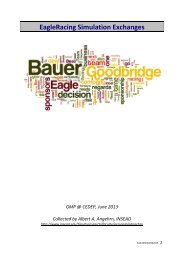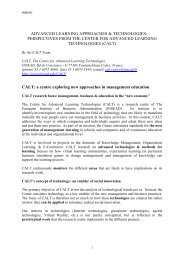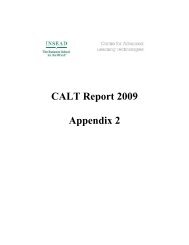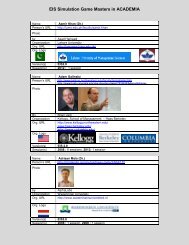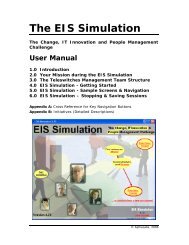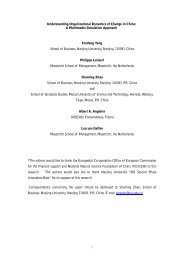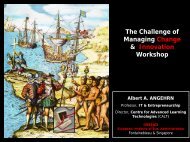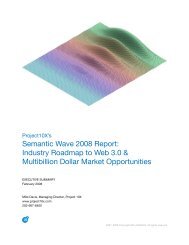pdf 820Kb - INSEAD CALT
pdf 820Kb - INSEAD CALT
pdf 820Kb - INSEAD CALT
Create successful ePaper yourself
Turn your PDF publications into a flip-book with our unique Google optimized e-Paper software.
Evaluation report of the use of Onto-Logging<br />
platform in the user site<br />
Deliverable ID: D8b<br />
Page : 54 of 110<br />
Version: 1.0<br />
Date: 27 january 2004<br />
Status: Final<br />
Confid.: Public<br />
Being allocated to different projects, writing projects proposals for various clients and<br />
proposing IT solutions are current tasks for Indra’s knowledge workers. The access to the<br />
right information and collaboration with experts help their efficiency and help them taking<br />
better decisions. Therefore it is necessary to make experience of people more visible in<br />
organization. The need “to know what people know, to make their experience with<br />
technology and products accessible” and “to find the right people” is useful for solving<br />
everyday tasks.<br />
These needs of the users validate the main research challenges of the project namely:<br />
• Research on mechanisms to better structuring and reusing knowledge (e.g. ontologies),<br />
• Research on more powerful mechanisms for searching and retrieving knowledge (e.g.<br />
advanced query mechanisms and the use of semantics annotations for retrieving<br />
knowledge),<br />
• Personalized information spaces for avoiding a condition of information overload and<br />
easiness of the use of the system (e.g. taking into account preferences of the users, the<br />
users’ needs, etc)<br />
• Better management of the tacit knowledge expressed as: “to know what people know and<br />
to make their experience with technology and products accessible”.<br />
5.2 Phase 1: Ontology Building (and some content population)<br />
Ontologies aim to structure and represent domain knowledge in a generic way which may be<br />
reused and shared across applications and groups.<br />
“Disparate backgrounds, languages, tools and techniques are a major barrier to effective<br />
communication among people, organizations and/or software systems (…) the implementation<br />
of an explicit account of a shared understanding (i.e. an “ontology”) in a given subject area,<br />
can improve such communication, which in turn can give rise to greater reuse and sharing,<br />
interoperability and more reliable software.” (Uschold and Gruninger, 1996).<br />
5.2.1 Ontology building (at INDRA)<br />
5.2.1.1 Description of the building process<br />
The process of knowledge domain modelling at INDRA, namely the tendering process<br />
modelling, went through an iterative phase in order to get to a shared understanding of<br />
concepts, to get to a complete ontology and to reach consensus towards the definition of<br />
concepts. The process of building the domain ontology was used in the process of the<br />
evaluation of the ontology modelling processes and tools. The design and implementation of<br />
the domain ontology at INDRA brought some interesting insights, which were captured<br />
through a specialized questionnaire. The questionnaire is attached in Annex 6.


